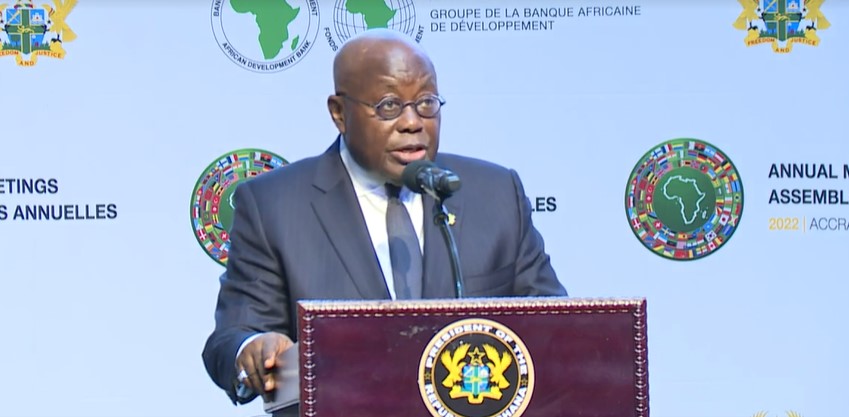It is my great pleasure to welcome you all to Ghana, and to the 57th African Development Bank and 48th African Development Fund Annual General Meetings.
As we say in Ghana, “Akwaaba!” You are amongst a people who pride themselves on their sense of hospitality. I hope that, by the end of your visit, you will agree with this claim.
I am particularly happy that I have been able to come to the opening ceremony of these meetings with my good friend, the highly respected, progressive President of the Republic of Mozambique, His Excellency Filipe Jacinto Nyusi, whose State Visit to Ghana has coincided with these meetings. It is good to see the first female President of the Republic of Tanzania, Her Excellency Samia Suluhu Hassan, and other African leaders also present to lend their support to the work of the Bank. They are all very welcome to their second home of Ghana.
I believe that the choice of Ghana to host the meetings has everything to do with the special place she holds as a beacon of stable, democratic governance in Africa, as well as the proverbial warm hospitality of the Ghanaian people. Indeed, these meetings, being held at a critical period in history, when Africa, like the rest of the world, is dealing with the twin effects of COVID-19 and the Russian invasion of Ukraine, could not find a better venue than our vibrant capital city of Accra.
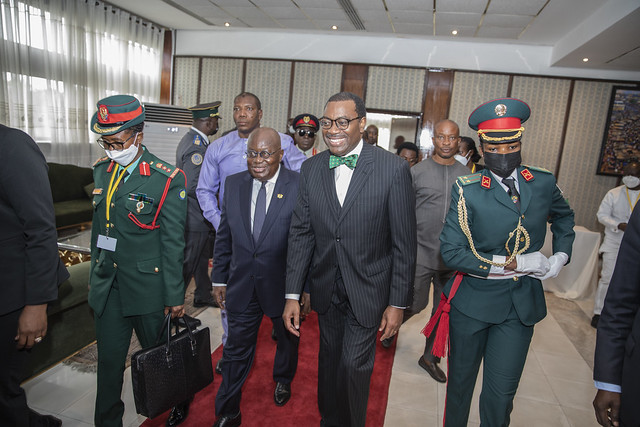
I congratulate the African Development Fund (ADF), the concessional lending arm of the African Development Bank, on the celebration of its golden jubilee. To invest some nine billion dollars ($9 billion) over the last five (5) years, up from an initial three hundred and twenty-seven million dollars (US$327 million) in 1976, is nothing short of exemplary. Congratulations are very much in order!!
Permit me, also, to commend the President of the African Development Bank Group, Dr. Akinwumi A. Adesina, for his extraordinary vision, passion and leadership. The African Development Bank is now a globally reputable bank, maintaining, even in difficult times, its stellar AAA-ratings, the only African financial institution with AAA-global credit ratings. The African Development Bank was ranked by the prestigious Global Finance Magazine as the Best Multilateral Financial Institution in the world in 2021. It is equally impressive that the African Development Fund (ADF) was also ranked by the Centre for Global Development in the US as the second best in the world among all concessional financing institutions, even ahead of the World Bank’s IDA and all the developed countries twenty-eight (28) concessional financing institutions of the OECD countries.
Ladies and gentlemen, this is the second consecutive year I am addressing the Bank’s Annual Meetings. I had the honour of doing so last year, albeit virtually. Our meetings today, which are being held in-person here in Accra, represent a great relief, following two years of unprecedented disruptions caused by COVID-19. In my address last year, I challenged us to prioritise five (5) main issues:
work towards a debt action plan;
collaborate and work with the World Bank and the IMF on the Debt Service Suspension Initiative and the G20 Common Framework;
explore options for the strategic use of the Special Drawing Rights (SDR) to support Africa through the AfDB;
work with IFAD and other global institutions to promote the establishment of a food security facility; and
promote the African Financial Stability Mechanism for greater financial market stability for Africa.

As we speak, the case for adhering immediately to these suggestions is even more compelling. We are now confronted with the consequences of the Russian invasion of Ukraine, which are compounding the emerging socio-economic vulnerabilities, which have been heightened by COVID-19. Since February, prices of staple food commodities have surged drastically. Africa faces a fertilizer shortage of some 2 million metric tons this year, estimated at $2 billion dollars, according to the International Fund for Agricultural Development, potentially creating a productivity deficit of twenty to fifty percent (20-50%) in agriculture. Rising food prices disproportionately affect African families, as food consumes some forty percent (40%) of household income, compared to less than twenty percent (20%) in advanced economies.
Energy markets have been significantly volatile, with dire consequences for households and public finances. According to the IMF, a five dollar ($5) per barrel increase in oil prices reduces global output by around 0.25 percent, but, for non-oil exporting economies in Africa, that figure increases to 0.6 percent. As a result, the United Nations Conference on Trade and Development has cut global growth prospects by 1 percent, and the World Economic Outlook (April,2022) predicts global growth will slow from 6.1 percent in 2021 to 3.6 percent in 2022; 0.8 percentage points lower than projected in January, 2022. Amidst economic slow-down and rising cost of fuel and food, the cost of living is increasing.
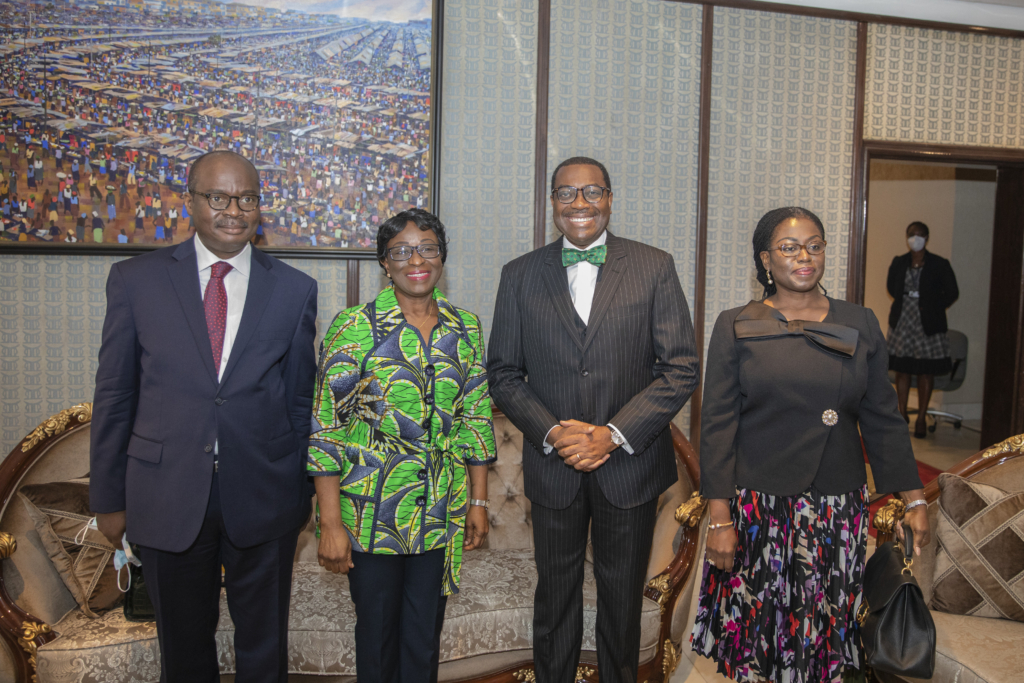
The immediate economic consequences – whether in the form of rising inflation, lower growth, increased inequality, and greater financial instability – are likely to permeate deeper, as they coincide with weakened economic positions due to the pandemic and preexisting and now elevated debt challenges.
The debt challenges are compounding for us in Africa. In pursuit of policy autonomy in the ‘Age of Choice’ for economic transformation, our debt profile has changed markedly. According to UNECA, the debt to GDP ratio rose from 60 percent to an estimated 71.1 percent between 2019 and 2020, largely because of the COVID-19 pandemic.
Eighteen (18) African economies have faced credit downgrades, even when all economies were suffering fallouts from the pandemic last year. Amidst these challenges, we must be aware of our vulnerability to the monetary policy stance of the US Federal Reserve, and the risk of so-called “taper-tantrums”, as investors may exit our markets further exacerbating the increasing cost of borrowing.

At this moment, support for non-IMF programme countries to alleviate the debt burden is limited. The initial facility designed to offer respite to economies with elevated debt challenges – the Debt Service Suspension Initiative (DSSI) – has expired since December 2021. Beyond the DSSI, the G20 Common Framework promised a comprehensive solution to the debt issue. To date, the few countries that took on the associated risk, by applying, have yet to receive the much-needed relief. We look forward to how the Resilience and Sustainability Trust (RST), which requires that countries be in an IMF Programme, will effectively serve the needs of our countries.
In these trying times, the IMF six hundred and fifty billion (650 billion) Special Drawing Rights (SDR), approved in August 2021, was meant to be of significant relief. However, based on the allocation principles, economies on this continent got US$33 billion (about 5 percent). Moreover, the promise to reallocate some US$100 billion of the SDR allocations to our economies, which was agreed to at the Paris Summit in 2019, has so far yielded about US$36 billion in pledges as of April 2022. The strategic decision to make the AfDB the delivery vehicle for these SDRs must be pursued and achieved. Leveraging the SDRs (four times as AfDB does) will significantly boost resources for Africa’s transformation.
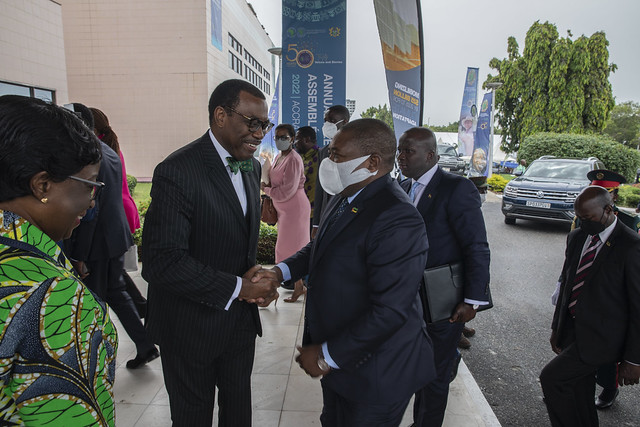
Ladies and Gentlemen, the combined effects of the debt situation, rising interest rates and rising cost of living are resulting in severe macroeconomic and financial instability. What is clear is that the resulting damage cannot be cured so easily with the limited fiscal tools at our disposal and national policy adjustments.
Therefore, I reiterate my call for an elevated role for Africa’s Premier Bank, the AfDB, only that, this time, I, respectfully, ask for a sense of urgency due to our mutual enlightened awareness. As a Triple A-rated financial institution with an active portfolio of some $61 billion in more than one hundred and forty-two thousand (142,000) locations, the AfDB is in a position to drive sustained transformation in Africa.
It is in this spirit that I am happy to learn that the AfDB Board has approved funding for the $1.5 billion Africa Emergency Food Production Plan to support countries to produce food rapidly, while delivering climate-resilient agricultural technologies to 20 million farmers and thus leveraging this facility over eight (8) times.
I am also encouraged to hear that the ‘right noises’ are being made towards establishing an African Financial Stability Mechanism to protect our economies from future shocks. The irony that we have a history riddled with economic shocks, but are the only continent in the world without financial buffers, has to be urgently remedied. I am persuaded that the African Financial Stability Mechanism will provide such protective cover for our economies, thus enabling us to counter effects of future pandemics amongst others.
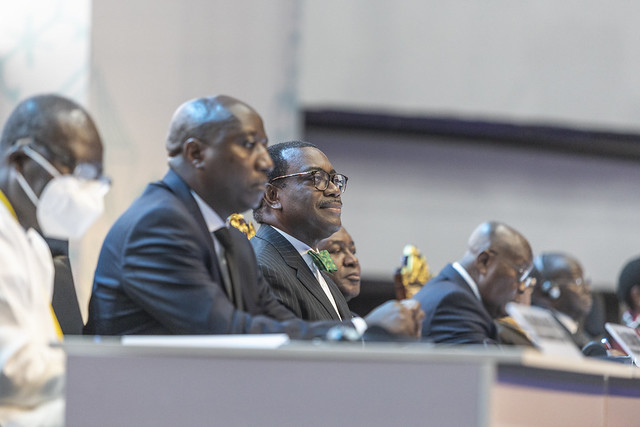
The confluence of rising challenges and expectations require that, together, we act with sustained conviction. Our support will be critical to building the Africa We Want, as espoused by Agenda 2063, from today. In addition to the pressing food, fuel and fiscal challenges, we still have to ensure that:
the remaining eighty-five percent (85%) of the continent’s population are vaccinated against COVID-19;
the remaining sixty percent (60%) of health facilities on the continent are connected to reliable source of electricity;
the teeming youth, who are over sixty percent (60%) of our population, are better educated and equipped for the job market, i.e. to become a digitally enabled entrepreneurial generation;
the Africa Continental Free Trade Area (AfCFTA) transforms Africa with her combined GDP of $3.3 trillion;
the physical and digital infrastructural deficits are addressed; and
the unrelenting insecurity and violence, creating about 2.5 million internally displaced people in the Sahel and elsewhere, are permanently addressed.
The stakes could not be higher and clearer. To move towards resolving these, we must support the Bank to do what a Bank does – to mobilise and invest funds. We must activate a process that moves this Bank from the corridors of ‘Billions to Trillions’, given the scale of the challenges on this continent.
Ultimately, the AfDB must become the dominant financing institution for African transformation in the medium term. This means we must bridge and overhaul the financing gap that exists with other complementary institutions. For instance, the financing gap between the IDA, the concessionary arm of the World Bank in Africa, and ADF now stands at almost five-fold, that is $15 billion compared to the ADF’s $3 billion per year. It is now time to:
ease the regulations that shackles the Bank from optimising its resources. Amending the articles that precludes the ADF from entering the market to leverage its resource must be first-order priority. In July last year, the IDA of World Bank (the equivalent of ADF) priced a 10-year Sustainable Development Bond that raised two billion euros (€2 billion). Subsequently, IDA’s funding programme expanded from US$ 5 billion in 2020 to US$ 10 billion in 2021. Such is the demonstrated power of the market beckoning the ADF. With an ADF equity of US$ 26 billion, the prospects could be an additional US$ 8-10 billion which could drive sustained transformation, especially for both fragile and states in transition on this continent;
consider carefully consolidating the balance sheets of both the ADB and ADF to enable it raise more resources. There are financial efficiency, policy, and administrative gains inherent to having a single entity with a consolidated balance sheet and harmonized fundraising and governance processes. Overlapping clients and majority of our countries requiring concessional access would enable this consolidation to be beneficial;
sustain efforts to leverage private investments into Africa. The OECD suggests that the $2.5 trillion financing gap for the SDG could balloon to $4.2 trillion. It points out that this gap could be filled by re-aligning just 1.1% of the $379 trillion in global financial assets under management. AfDB must lead in crowding in these resources; and
demonstrate foremost interest in the proposal by the AU to explore the issuance of Security-Indexed Investment Bonds to raise funds to address the root causes of increasing insecurity and poverty.
With increased financial resources, the Bank could recapitalize key African financial institutions, such as the Regional Development Banks, Afreximbank, Africa Guarantee Fund, Africa-Reinsurance Company and Africa50.
This will harness the collective institutional strengths of Africa for sustained transformation, and will, thus, avoid the situation whereby, for example, the IMF, as at the end of 2021, was able to lend forty-one billion dollars ($41 billion) to Argentina, with a population of forty-five million people, compared to thirty-four billion dollars ($34 billion) for the whole of sub-Saharan Africa, with a population of 1.14 billion people.
Empowering these African institutions and engaging communities will be vital to addressing the socio-ecological challenge of our time - Climate Change.
Beyond pursuing ecological restoration, the AfDB should foster a culture of proactive and risk-based approaches; away from current reactive and crisis-based practices. This should involve effective coordination, communication and cooperation, driven by adequate finance and political will. As the AU Champion of Financial Institutions in Africa, I pledge my support in this regard.
Given our peculiar energy challenges, the Bank should engage actively the discourse on shifting to a more sustainable economic model without making African communities and nations worse-off. The cost of climate to our common humanity keeps increasing, with our continent bearing a disproportionate burden, though we have caused the least emissions of 3.8%, with the Western nations being responsible for seventy-six percent (76%).
Yet, only $6 billion out of the worldwide total of $30 billion of climate adaptation finance flows to Africa, even though the United Nations Environment Program has projected that between 75 million and 250 million people would be affected by climate-induced water stress. Not to mention, financing COP26 compliance could potentially strand Africa’s natural resources, including natural gas. How do we develop under such unfair circumstances?
The Bank must empower Africa to seek justice in the journey to clean energy in a manner that optimizes the exploitation of our abundant natural resources. The design and focus of a Just Energy Transition Facility are timely, as they offer material support for powering and lighting up Africa, and still meet the targets of climate. We must light-up and power Africa to enable her feed herself, integrate and industrialise.
We must ensure that our prioritised climate actions are consistent with our current challenges and aspirations as a continent. This will be a demonstration of the theme chosen for this Annual Meetings. We must avoid our natural resources being stranded in the upcoming negotiations in Egypt at COP 27.
The stronger bonds between, ecology, economy and conflicts demand that a bold and holistic approach is taken. It is in that light that I consider the theme of this Annual Meetings both timely and appropriate. At the end of these meetings, Africa expects a framework that reconciles people and planet for peace. We cannot fail the people and the planet. Both must win. But for this to happen, Africa must win.
Ladies and gentlemen, the time has come to move towards an economic model which serves our interests, not others. Profits from our resources have benefitted foreign creditors for too long, while we suffer abusive borrowing costs on the international capital markets.
There is no basis for our economies being saddled with a so-called "African Risk Premium", which translates into higher spreads than for our European and American counterparts, particularly when our resources were the catalysts for the economic advancement of Western nations. It is time we worked to address the structural barriers to our development.
We must also deal with "tax-dodging" and illegitimate commercial transactions by multinationals, which account for sixty percent (60%) of the eighty-eight billion dollars (US$88 billion) of illicit financial flows from the continent annually, and other relationships which inhibit our development.
I am comforted by the array of expertise available to us. Now more than ever, it has become urgent to take the necessary steps to transition us towards becoming a resilient continent. Africa must exploit her productive capabilities collectively, and build the capacity of her continental development banks in order to realise the Africa We Want and an Africa Beyond Aid.
Accordingly, ladies and gentlemen, it is my singular honour to declare the Annual General Meetings of the African Development Bank Group, duly open.
I wish you a very fruitful meeting.
May God bless the African Development Bank Group, Mother Africa, and us all.
I thank you for your attention.
Latest Stories
-
American Airlines resumes flights after technical issue
12 minutes -
NDC Greater Accra Chairman dismisses unauthorised appointment nomination request
24 minutes -
Man City might miss out on Champions League – Guardiola
43 minutes -
Joy FM’s Party in the Park set to thrill at Aburi Botanical Gardens today
55 minutes -
KiDi performs with childhood idol, Kojo Antwi at ‘Likor On The Beach’
1 hour -
South Korea MPs file motion to impeach acting president
2 hours -
Star Oil Ltd @ 25: Driving growth and profitability with a vision for renewable energy and a sustainable future
2 hours -
Bald eagle officially declared US national bird after 250 years
2 hours -
Krachi East leads Oti MDAs in 2023 Performance Evaluation
3 hours -
‘Accept the results in humility’ – Speaker Bagbin’s call for reflection after 2024 elections
3 hours -
Ghana is destined for greatness – Akufo-Addo
3 hours -
‘None of us expected this outcome, but God intervened’ – Speaker Bagbin on 2024 Elections
3 hours -
Court convict’s miner for setting stepfather’s house on fire
3 hours -
‘Ghana remains a beacon of hope and democracy for Africa’ – Bagbin urges unity after 2024 elections
3 hours -
Herbalist, 45, jailed for defiling 10-year-old boy
3 hours

